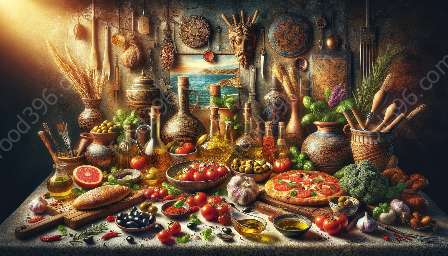The Mediterranean climate plays a vital role in shaping the cuisine of the regions that border the Mediterranean Sea. This environment, characterized by mild, wet winters and hot, dry summers, has influenced the cultivation of a wide variety of ingredients that are fundamental to Mediterranean cuisine. Understanding the significance of the Mediterranean climate in relation to the history of Mediterranean cuisine provides valuable insights into the development and evolution of this rich culinary tradition.
The Mediterranean Climate
The Mediterranean climate is found in regions bordering the Mediterranean Sea, including Southern Europe, North Africa, and parts of the Middle East. It is characterized by warm to hot, dry summers and mild, wet winters. This unique climate is influenced by the sea's moderating effect, which helps maintain relatively stable temperatures throughout the year.
The combination of ample sunshine, moderate rainfall, and fertile soils creates an ideal environment for farming and the cultivation of a diverse range of crops. The Mediterranean climate favors the growth of specific plants and crops, including olive trees, grapevines, citrus fruits, wheat, and a variety of herbs and vegetables. These ingredients form the foundation of Mediterranean cuisine and are central to many traditional dishes.
Influence on Agriculture and Culinary Traditions
The Mediterranean climate has significantly impacted agricultural practices and culinary traditions in the region. The abundance of sunlight and favorable growing conditions have made the cultivation of olives and grapes particularly successful. As a result, olive oil and wine, both essential components of Mediterranean cuisine, have been produced in the region for thousands of years.
Additionally, the climate fosters the growth of an array of herbs and vegetables, such as basil, oregano, tomatoes, and eggplants, which are widely used in Mediterranean cooking. The availability of these fresh, flavorful ingredients has shaped the culinary traditions of the region, leading to the development of dishes like ratatouille, caponata, and various types of pasta sauces.
Historical Impact on Mediterranean Cuisine
The historical impact of the Mediterranean climate on cuisine is evident in the traditional dishes and culinary techniques that have been passed down through generations. The cultivation of olives and grapes, for instance, has not only contributed to the production of olive oil and wine but has also influenced the cooking methods and flavor profiles of Mediterranean dishes.
Furthermore, the climate has influenced the grazing of animals and the production of dairy products, such as sheep's milk cheese and yogurt, which are integral parts of Mediterranean cuisine. The availability of fresh seafood, another result of the Mediterranean climate, has also played a significant role in shaping coastal cuisines throughout the region.
Evolution of Mediterranean Cuisine
Over time, the interplay between the Mediterranean climate and culinary traditions has led to the evolution of Mediterranean cuisine into a diverse and flavorful culinary heritage. The use of local, seasonal ingredients and the emphasis on simplicity and freshness are key characteristics of Mediterranean cooking that reflect the influence of the climate on the region's food culture.
As Mediterranean cuisine continues to evolve, the impact of the climate remains essential, with chefs and home cooks alike drawing inspiration from the bountiful harvests and traditional practices that have been shaped by the unique environmental conditions of the Mediterranean region.

